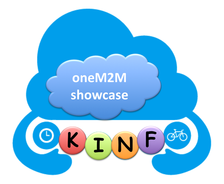EU Horizon 2020: FIESTA project
Period: 2015.02 ~ 2018.01 (36 months)
Members: KETI (together with Sejong University), NEC Europe Ltd., Fraunhofer, University of Surrey, etc.
Project coordinator: Prof. Song JaeSeung (Korea side)
Abstract: Despite the proliferation of IoT and smart cities testbeds, there is still no easy way to conduct large scale experiments that leverage data and resources from multiple geographically and administratively distributed IoT platforms. Recent advances in IoT semantic interoperability provide a sound basis for implementing novel cloud-based infrastructures that could allow testbed-agnostic access to IoT data and resources. FIESTA will open new horizons in IoT experimentation at a global scale, based on the interconnection and interoperability of diverse IoT testbeds. FIESTA will produce a first-of-a-kind blueprint experimental infrastructure (tools, techniques and best practices) enabling testbed operators to interconnect their facilities in an interoperable way, while at the same time facilitating researchers in deploying integrated experiments, which seamlessly transcend the boundaries of multiple IoT platforms. FIESTA will be validated and evaluated based on the interconnection of four testbeds (in Spain, UK, France and Korea), as well as based on the execution of novel experiments in the areas of mobile crowd-sensing, IoT applications portability, and dynamic intelligent discovery of IoT resources. In order to achieve global outreach and maximum impact, FIESTA will integrate an additional testbed and experiments from Korea, while it will also collaborate with IoT experts from USA. The participation of a Korean partner (based its own funding) will maximize FIESTA’s value for EC money. Moreover, the project will take advantage of open calls processes towards attracting third-parties that will engage in the integration of their platforms within FIESTA or in the conduction of added-value experiments. As part of its sustainability strategy, FIESTA will establish a global market confidence programme for IoT interoperability, which will enable innovative platform providers and solution integrators to ensure/certify the openness and interoperability of their developments.
Period: 2015.02 ~ 2018.01 (36 months)
Members: KETI (together with Sejong University), NEC Europe Ltd., Fraunhofer, University of Surrey, etc.
Project coordinator: Prof. Song JaeSeung (Korea side)
Abstract: Despite the proliferation of IoT and smart cities testbeds, there is still no easy way to conduct large scale experiments that leverage data and resources from multiple geographically and administratively distributed IoT platforms. Recent advances in IoT semantic interoperability provide a sound basis for implementing novel cloud-based infrastructures that could allow testbed-agnostic access to IoT data and resources. FIESTA will open new horizons in IoT experimentation at a global scale, based on the interconnection and interoperability of diverse IoT testbeds. FIESTA will produce a first-of-a-kind blueprint experimental infrastructure (tools, techniques and best practices) enabling testbed operators to interconnect their facilities in an interoperable way, while at the same time facilitating researchers in deploying integrated experiments, which seamlessly transcend the boundaries of multiple IoT platforms. FIESTA will be validated and evaluated based on the interconnection of four testbeds (in Spain, UK, France and Korea), as well as based on the execution of novel experiments in the areas of mobile crowd-sensing, IoT applications portability, and dynamic intelligent discovery of IoT resources. In order to achieve global outreach and maximum impact, FIESTA will integrate an additional testbed and experiments from Korea, while it will also collaborate with IoT experts from USA. The participation of a Korean partner (based its own funding) will maximize FIESTA’s value for EC money. Moreover, the project will take advantage of open calls processes towards attracting third-parties that will engage in the integration of their platforms within FIESTA or in the conduction of added-value experiments. As part of its sustainability strategy, FIESTA will establish a global market confidence programme for IoT interoperability, which will enable innovative platform providers and solution integrators to ensure/certify the openness and interoperability of their developments.

KINF oneM2M showcase project
Period: 2014.06 ~ 2014.12 (6 months)
Members: Sejong University, KETI, InterDigital, NEC Europe Ltd., Fraunhofer
Project manager: Prof. Song JaeSeung
The KINF (KETI-InterDigital-NEC-Fraunhofer) joint showcase introduces smart city applications/services (from NEC) run on multiple IoT service layer platforms (from InterDigital, KETI and Fraunhofer) interworking each other. The main purpose of the KINF showcase is to show how M2M/IoT service providers are using oneM2M compliant service layer platforms to deliver services more efficiently across multiple technology domains in particular for smart city. KINF shows (1) registration procedures of sensors and actuators to a oneM2M compliant service layer platform; (2) mutual registrations of multiple adjacent service layer platforms; (3) and smart city applications that discovers the registered devices and introduces semantic data enabling fast auto-configuration and big-data analytics. Since the deployment configurations of the KINF showcase span multiple domains (i.e., field domain for end devices and infrastructure domain for infrastructure nodes) and the node entities (i.e., ADN, ASN, MN and IN) are from different companies, KINF clearly delivers messages that the oneM2M specifications can provide a service layer which enables services and interoperability between devices/device networks and cloud-based applications.
Period: 2014.06 ~ 2014.12 (6 months)
Members: Sejong University, KETI, InterDigital, NEC Europe Ltd., Fraunhofer
Project manager: Prof. Song JaeSeung
The KINF (KETI-InterDigital-NEC-Fraunhofer) joint showcase introduces smart city applications/services (from NEC) run on multiple IoT service layer platforms (from InterDigital, KETI and Fraunhofer) interworking each other. The main purpose of the KINF showcase is to show how M2M/IoT service providers are using oneM2M compliant service layer platforms to deliver services more efficiently across multiple technology domains in particular for smart city. KINF shows (1) registration procedures of sensors and actuators to a oneM2M compliant service layer platform; (2) mutual registrations of multiple adjacent service layer platforms; (3) and smart city applications that discovers the registered devices and introduces semantic data enabling fast auto-configuration and big-data analytics. Since the deployment configurations of the KINF showcase span multiple domains (i.e., field domain for end devices and infrastructure domain for infrastructure nodes) and the node entities (i.e., ADN, ASN, MN and IN) are from different companies, KINF clearly delivers messages that the oneM2M specifications can provide a service layer which enables services and interoperability between devices/device networks and cloud-based applications.

Open IoT Platform - Mobius
Period: 2011.12 ~ 2014.11 (3 years)
Members: KETI, SK Telecom, Sejong University, Yonsei University, etc.
The Internet of Things (IoT) is gaining ground in various vertical domains such as healthcare, home automation and public services. Since IoT connects all smart objects and en- ables them to communicate with each other, the intelligent ser- vices introduced by IoT will provide a huge impact on our everyday life. Additionally, IoT is expected to create a new ecosystem involving a wide array of players such as device developers, service providers, software developers, network operators, and service users. This requires an open platform satisfying all different needs from various stakeholders and providing standardised mechanisms for managing IoT devices.
In this project, we introduce an open service framework for the Internet of Things called Mobius 1.0. The Mobius platform is an open IoT implementation realising true IoT mass market and establishing a global IoT ecosystem with the worldwide use of IoT devices and softwares. We believe that the Mobius framework will play a key role in the widespread adoption of the Internet of Things in our everyday life. We also hope that Mobius opens up endless opportunities to all related stake- holders as well as various vertical domains in the world of information and communication technologies.
Period: 2011.12 ~ 2014.11 (3 years)
Members: KETI, SK Telecom, Sejong University, Yonsei University, etc.
The Internet of Things (IoT) is gaining ground in various vertical domains such as healthcare, home automation and public services. Since IoT connects all smart objects and en- ables them to communicate with each other, the intelligent ser- vices introduced by IoT will provide a huge impact on our everyday life. Additionally, IoT is expected to create a new ecosystem involving a wide array of players such as device developers, service providers, software developers, network operators, and service users. This requires an open platform satisfying all different needs from various stakeholders and providing standardised mechanisms for managing IoT devices.
In this project, we introduce an open service framework for the Internet of Things called Mobius 1.0. The Mobius platform is an open IoT implementation realising true IoT mass market and establishing a global IoT ecosystem with the worldwide use of IoT devices and softwares. We believe that the Mobius framework will play a key role in the widespread adoption of the Internet of Things in our everyday life. We also hope that Mobius opens up endless opportunities to all related stake- holders as well as various vertical domains in the world of information and communication technologies.
Building As a Service (BaaS)The BaaS system aims to optimize energy performance in the application domain of "non-residential buildings, in operational stage. In the building operational life-cycle three significant tasks have to be continuously performed: collect information and assess the buildings current state; predict the effect that various decisions will have to Key Performance Indicators (KPIs); and optimize performance. A generic ICT-enabled system will be developed to provide integrated assess, predict, optimize (APO) services that guarantee harmonious and parsimonious use of available resources.
